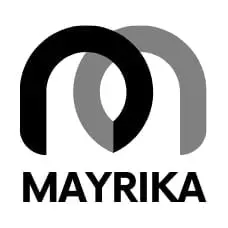Copper cookware makes a beautiful addition to any kitchen, but it can be hard to maintain. With this quick and easy guide, you’ll learn how to clean copper cookware with ease!
Cleaning copper cookware can be a challenge. The two main methods for cleaning any cookware are scouring and soaking.
Scouring is the process of using abrasive materials to remove the dirt, grease, or food residue from surfaces by rubbing it off with an object like steel wool.
Soaking submerges in the water while applying heat and agitation such as boiling, brushing, or scrubbing with soap or detergent.
Clean copper pots and pans right after you cook!
Clean Copper pots and pans right after you cook. The next time your copper is dirty put it in the dishwasher with a load of other things (don’t forget about using an environmentally friendly detergent).
And check on it periodically to ensure that you didn’t forget anything that would dissolve in water.
When all your dirty dishes are washed and rinsed, turn off the dishwasher and remove the basket from the inside.
Immediately clean your copper pots and pans by scrubbing in any residue if needed, adding some baking soda, and rubbing around to buff away any residual with a sponge or dishcloth.
Then rinse thoroughly before hanging on a suitable drying rack or towel for air-dry.
Related: Top 4 Best Copper Non-stick Cookware – To Buy Online
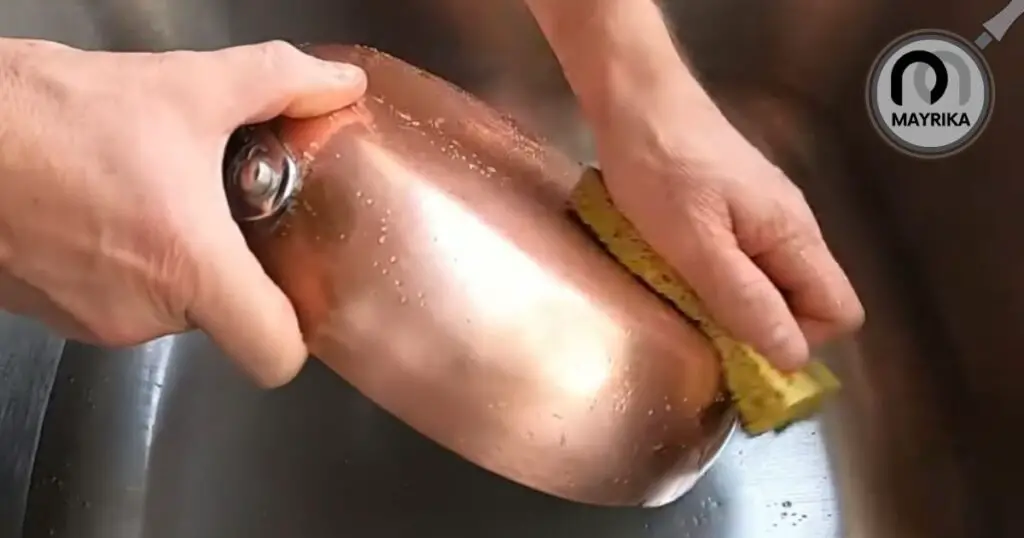
Clean copper pans with worcestershire sauce
Pour enough Worcestershire sauce in a bowl to allow the copper pan to submerge while leaving room for shaking thoroughly. Place a rag or paper towel over the top of the wok and use your hand to swish it around.
Once sufficiently saturated, hold the pan up and shake off any excess liquid before letting it air dry with the top down on some newspaper or wax paper until all sign of discoloration has been removed.
You may need more than one application, depending on how dirty your pan is. Keep in mind that constant exposure to high acidity will negatively affect the metal’s durability.
So make sure you create time gaps between successive sessions when cleaning this way – at least 4 days.
Clean copper pots and pans with lemon juice and tartar cream
Dousing your copper pots and pans in acidic lemon juice is convenient for pesky stains and oxidation. However, plenty of people swear that they clean their copper pots and pans even more often with a little bit of tartar cream.
We call it the “marathon option.” Both will work well, so choose the method you prefer!
Indeed, not everybody agrees on which was best to use for cleaning out the pot. Still, at least we can all agree that lemons provide excellent health benefits for us all!
Clean copper pots and pans with lemon juice and baking soda
At first, it sounds like a good idea. Lemon’s acidic properties will seek out and dissolve fingerprints and other dirt that copper would normally oxidize when exposed to water.
However, too much acid can damage the metal’s protective oxide layer; imagine what lemons do to brass!
Baking soda is chemically neutral (which is precisely why it does a great job at removing odors with its heavy base), so it should be safe for cooking utensils.
But baking soda without lemon juice doesn’t have much cleaning power either, so don’t expect your foil pans to come clean after using this method.
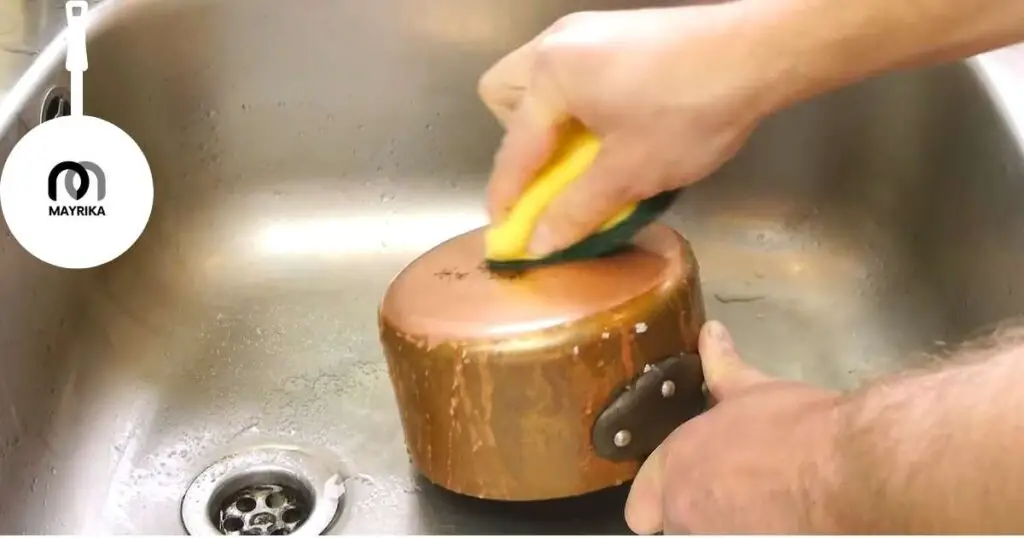
Clean copper pots and pans with salt and vinegar copper cleaner
Salt and vinegar copper cleaner is a blend that can be used as a natural metal-friendly alternative to commercial cleaners. It does not contain chlorine or ammonia, two of the harshest ingredients in commercial copper cleaners.
It does not leave any unpleasant chemical smell after application. Best of all, it takes less than five minutes to mix.
- 1 Cup White Distilled Vinegar
- 2 Cups Table Salt 1 Teaspoon Orange Oil (Optional) 4 Drops Apple Cider Vine Clarity (Optional)
- 3 Pounds Water
How do you use salt and vinegar cleaner for copper cleaning? Target pans with heavy stains or dirt by applying generous amounts of combined salt and vinegar solution until all surfaces are saturated.
What is the best way to clean copper pans?
Copper pans are a popular option for cooking because they heat evenly and prevent the formation of hotspots.
However, copper pans can be difficult to clean. The best way to clean copper pans is to use a mixture of white vinegar and salt.
First, add enough vinegar to cover the bottom of the pan. Next, add enough salt so that it forms a thick paste. Use a scrub brush to scrub the paste into the pan. Rinse the pan with hot water and dry it with a towel.
How do you clean badly tarnished copper?
Cleaning copper that is badly tarnished can be a difficult task. The tarnish is usually a result of oxidation, and it can be removed with the use of strong acids or abrasives.
However, it is important to take caution when cleaning copper, as the metal is prone to staining and scratching.
One method for cleaning badly tarnished copper is to use a mixture of lemon juice and baking soda. The lemon juice will help to break down the oxidation, while the baking soda will help to clean and polish the copper.
Another option is to use a commercial copper cleaner, such as Wright’s Copper Cream. Wright’s Copper Cream contains oxalic acid, which helps to remove the tarnish quickly and easily.
Finally, if neither of these methods works, it may be necessary to use a stronger acid, such as hydrochloric acid or sulfuric acid.
How do you get burnt on grease off a copper pan?
Cleaning copper pans can be difficult for some people. Especially when the pan has so much burnt-on grease, it’s hard to believe how to go about cleaning it up without scrubbing too hard and causing more damage to the pan.
But don’t fret–some methods make doing this part of your kitchen clean-up routine much more effortless.
First, fill a large pot or sink with water and bring it to a vigorous boil. Place the copper pan into the boiling water for about 3 minutes before removing it from heat and letting it cool completely.
So you don’t get burned by a hot pan or singed bacon fat if there is any in your pan as well! Then use dish soap, baking soda, salt, and water.
Baking soda
Copper reacts with lemon, vinegar, and baking soda (sodium bicarbonate) to create a slippery substance to slough the grease.
Put 2 tablespoons of baking soda in the pan along with enough lemon juice or vinegar to cover the bottom of the pan and stir well.
Let it stand for up to 5 minutes, then brush off any remaining grime before washing, as usual, using soapy water.
Be sure not to use this method on stainless steel pans or any non-copper pans because it will permanently damage them.
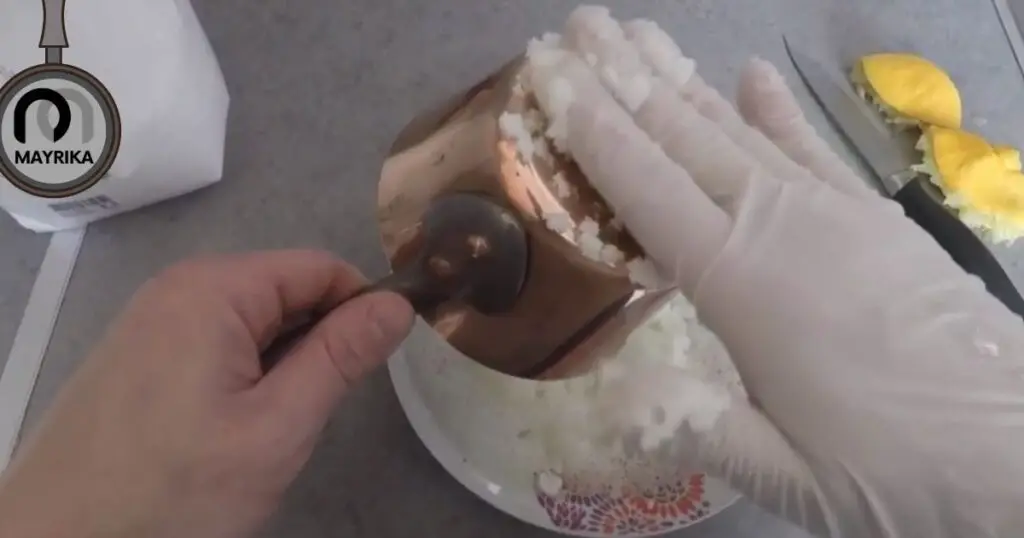
The ketchup
It’s just ketchup. You use it as a deglaze, pour some on the food that burnt to cause an acidic reaction, and then scrape off the grease with a spatula!
The thing is, copper pans are usually fantastic on their own, so if people feel like this needs to be polished back up occasionally, they can.
This is a question with which many homeowners grapple at one time or another. The best solution is always ketchup because it contains sugar (as does bread), oil, and vinegar to remove burnt-on grease and residue from cooking utensils.
Combining these three items creates an oleoresin capable of cutting through stubbornly resistant substances like fats–grease, in this case. It’s also a more realistic option than commercial products.
Combine one tablespoon of ketchup with one teaspoon of each oil and apple cider vinegar in a small pot on the stove over medium heat, until reduced by half into a syrupy consistency of about 10 minutes.
Wash the pan until it’s completely clean. Rinse with hot water and let air dry afterward; place out of reach from children and pets because you will have some sticky surfaces!
Vinegar
Burnt on greasy means oils have been heated beyond their smoking point. This indicates something has gone wrong in our cooking process that we should note to avoid making the same mistake next time.
Like turning down the heat or stirring more often to prevent curdling, scorching, or burning.
It’s ok! Many times, life happens, and this is not always as possible as it should be (new house!).
You can still salvage your dish by following these steps: soak all copper pieces for at least 3 hours in cold water without soap; pour boiled.
- Place some full-strength vinegar in cold water.
- Immerse the pan in the mixture and let it soak for 20 minutes.
- Scrub your way through, making sure to use a scrub brush.
- Rinse out thoroughly as you scrub until there’s no hint of acidity left on either surface of the pan.
- Dry with a paper towel or napkin to soak up any excess moisture that remains before putting away to dry entirely overnight on a dish rack or draining board.
Caring for copper pots & pans
If you have non-stick copper pots and pans, take care not to use the dishwasher, steel wool pads, or abrasive cleaners on them.
The non-stick material they’re coated with is usually made from PTFE (Polytetrafluoroethylene) or Teflon – two substances that can break down when exposed to high temperatures or chemicals.
If the protective coating does wear away at any point, quickly clean it off. Before it soon turns into a brittle powder that will scratch and discolor your pot’s surface.
What you can do instead: Like most cookware of its kind, this type of fry pan should be hand washed with a bit of soap and water.
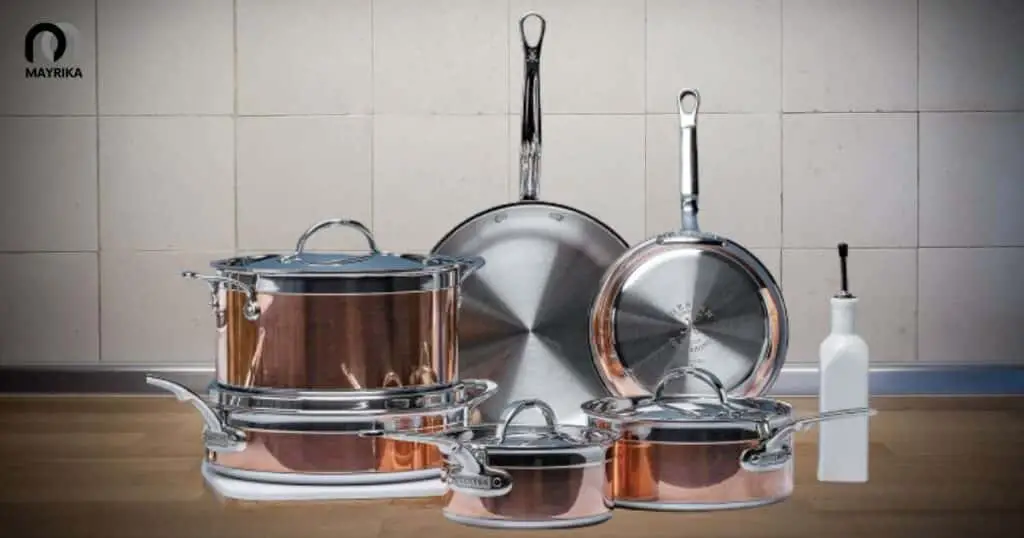
Never heat a dry copper pan
It is also advisable to not ever dry out copper pans and leave them empty. To use a dry pan on the stovetop: heat it before use (wiping it down if greasy) or leave a thin layer of oil in it at all times with little bits of kosher salt sprinkled on top.
Repair damaged areas of copper cookware
Repair damaged areas of copper cookware by sanding them with fine sandpaper. Wash the metal, then apply two coats of copper paint and allow it to dry. Rub down each coat with the steel wool pad until smooth.
What not to do when using copper pots and pans
There are many dos and don’ts when it comes to cooking, and copper cookware is no exception. Here are the top three things you never want to do when using copper pots and pans:
- Don’t use steel wool or abrasive cleaners on your copper cookware – this can scratch the surface and make it difficult to clean.
- Don’t put your copper cookware in the dishwasher – harsh detergents can damage the finish.
- And finally, don’t ever use high heat on your copper cookware – this can cause the metal to warp or even melt.
Final Words
If you have copper cookware, it’s important to know how to clean copper cookware properly? We’ve given a few helpful tips and tricks for keeping your kitchen looking new.
The best way to clean copper cookware is with a mixture of baking soda and water. This will strip the residue off without damaging your cookware or leaving a film on it.
You can also use vinegar, which works similarly but leaves a scent behind when you’re done cleaning. Happy cooking!
FAQs
-
How do you remove oxidation from copper cookware?
To remove oxidation from copper cookware, you can create a paste using baking soda and water. Apply the paste to the cookware and allow it to sit for 20 minutes. Rinse the cookware with warm water and towel dry.
-
How do you get red stains out of copper pans?
Red stains can be removed from your copper cookware by cleaning them with warm water and salt paste. Or, you can use regular ammonia to get red stains out of your copper cookware.
-
What is the best cleaner for copper pots?
The best cleaner for copper pots is Bar Keepers Friend. It is made out of aluminum oxide and other compounds. It is very effective for cleaning up copper and copper utensils.
The product can also be used for cleaning other metals and tarnished objects and will not harm the user.
-
Is it OK to clean copper with vinegar?
Yes, it is OK to clean copper with vinegar. Vinegar is a mild acid that can dissolve the copper oxide layer that forms on the surface of copper.
However, be sure to rinse the vinegar off the copper thoroughly, as leaving vinegar on the copper can cause it to corrode.
-
What is the best home remedy to clean copper?
One of the best home remedies to clean copper is to use ketchup. Pour some ketchup on a cloth and rub it onto the copper. Rinse with water and dry with a cloth.
-
What natural product cleans copper?
There are a few natural products that can clean copper. One is lemon juice, which can be used to remove tarnish from the metal. Another option is vinegar, which can also dissolve tarnish.
-
How do you keep copper shiny?
To keep copper shiny, you can use metal polish or a vinegar and salt mixture. First, clean the copper surface with a soft cloth and warm water.
Then, apply the metal polish or the vinegar and salt mixture to a soft cloth and rub it on the copper.
